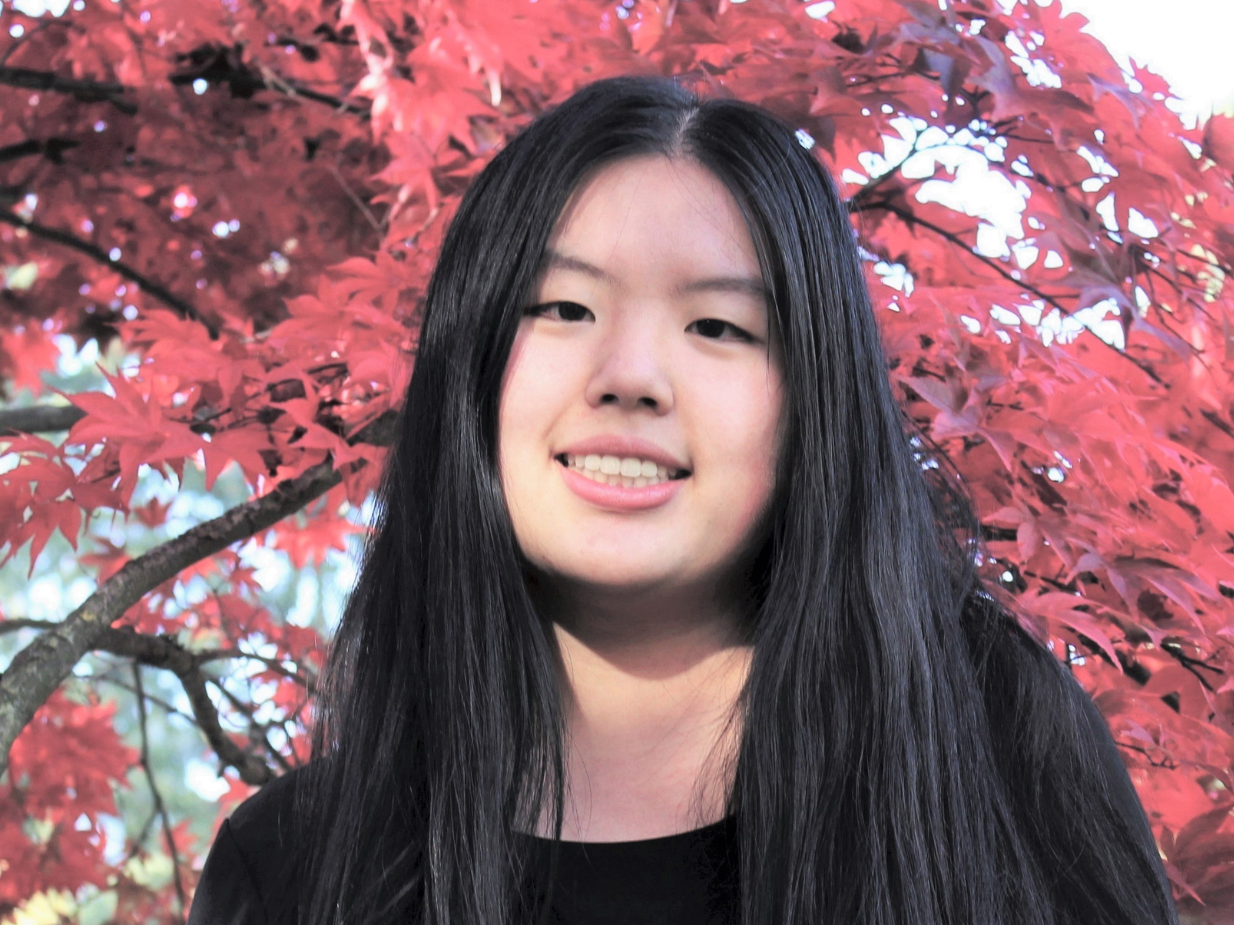
Michelle Xie
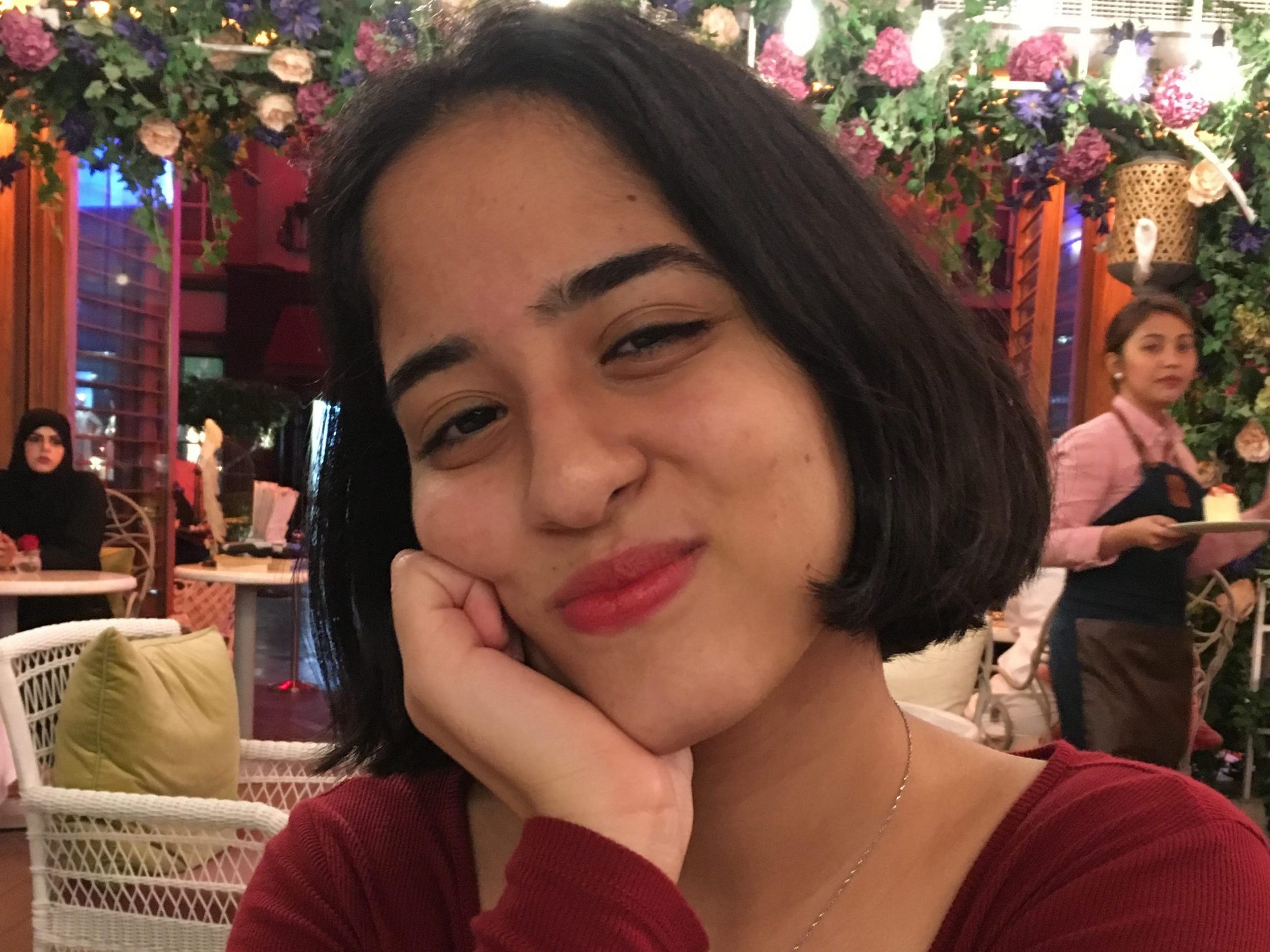
Yasmina Seifeddine
Thursday, April 6, 2023,
Interview by Fumika Noguchi, Climate Emergency Response team
Climate Justice UBC (CJUBC) is a group of students who organize to tackle climate change and its root causes, and they see the climate movement as inseparable from movements for racial, social, and economic justice. CJUBC aims to hold UBC accountable to its students by calling on them to reinvest 10% of their endowment into community impact investments.
Michelle Xie (she/her) and Yasmina Seifeddine (she/her) are two undergraduate students at UBC-V who are dedicated to advancing climate justice within the UBC community and beyond.
Join us in this Q and A with the two, as they discuss CJUBC’s demands for UBC to follow up on their fossil fuel divestment commitments, how the Climate Emergency Fund (CEF) has supported CJUBC’s work and values, and the deeper message behind the recent release of the CJUBC CEF Grant Report.
WHAT IS YOUR CLIMATE STORY
Michelle:
I have always cared deeply about community wellbeing and social justice — part of that comes from witnessing the intergenerational legacies of colonialism, war, and revolution. I think about the stories of my ancestors, the heaviness of the oppression that we carry, and how these experiences get stored in the body. These experiences orient me towards understanding community organizing as survival work and as opportunities for transformation by building collective power and robust community infrastructure to both prevent and repair harm.
I grew up around the False Creek area which allowed me to develop a strong appreciation and connection to the lands and waters, whether that was tending to my school’s community garden or taking part in a coho salmon restoration project. All of this taught me so much about reciprocity and change-making in a localized context. During the 2010 Winter Olympics, cement was poured over the park in my neighbourhood to create a temporary pavilion for Coca-Cola. Seeing how harmful corporations could quickly alter landscapes and take away green spaces left a big impression on me. Upon reflection, there is such a clear link between the continued prioritization of profit over people and the planet, which enables fossil fuel dependency and drives this crisis.
In high school, my search for justice-centered spaces became driven by a desire to connect with others who were passionate about systems change and concerned about the future. This led me to organize with groups like the Sustainabiliteens, Climate Strike Canada, and eventually CJUBC in 2020. I am excited to continue exploring what my role in the climate justice movement looks like and to shift my work towards centering abolitionist praxis, disability justice, and decolonial pedagogies.
Yasmina:
Two years ago, I joined CJUBC and in those two years alone, my idea of doing climate work or what would constitute as climate work has radically changed. I only had access to climate or student activist spaces upon coming to UBC, which wasn’t available where I grew up in Dubai, UAE. From a young age, I felt we were subliminally made aware of environmental issues or global inequalities in general – which was especially the case for me as a child of the Lebanese diaspora. I believe this implants a very simplified or optimistic idea of justice when you’re young, but eventually came crashing down when I has become more aware of the existential nature of the climate crisis.
Coming here to UBC and being in CJUBC, these climate spaces became areas in which I unlearned a lot of harmful and conditioned knowledge, especially in terms of our neoliberal capitalist world. I was also relearning what it meant to be a part of a very fulfilling community and to exist in relation to each other with care. CJUBC is where I also relieved a lot of my climate anxiety. This is because when you’re alone and you realize just how big and scary the climate crisis is, you tend to fall in on yourself. But when you come into these spaces, you realize it’s about creating and embodying a collective effort. Like Michelle, I am at a place right now where I’m changing my idea of what it means to do climate work, or looking at climate work that might not be explicitly called ‘climate work’.
HOW DO YOU THINK UBC SHOULD BE DEMONSTRATING STRONGER INSTITUTIONAL LEADERSHIP ON CLIMATE JUSTICE?
Michelle:
As a part of a community engaged research project between the Climate Hub and CJUBC, I co-authored a report called Complicity in the Climate Emergency. It investigates UBC’s enduring ties to the fossil fuel industry in this post-divestment era. There were three main areas of focus that have since informed the campaigns CJUBC is working on this year:
One was corporate donations, exploring direct financial contributions and funds donated from the fossil fuel industry to create student scholarships. We looked at how this grants the industry social license to operate. As such, one recommendation moving forward would be to have comprehensive corporate donor data be made publicly available.
The second was exchanges of human capital. This looks at the flow of people from the fossil fuel industry into the university and vice-versa; Specifically, how student recruitment from career fairs helps build a new generation of fossil fuel workers. We are advocating for UBC to develop an ethics of engagement policy like those that emerged from universities against the tobacco industry in the early 2000s. To do this, we look to frameworks like the Fossil Free Careers campaign.
The third area is research funding, so how fossil fuel funding impacts the quality, direction, and outcomes of research produced, and how it facilitates extraction and contributes to a positive public image of these companies. We’re demanding transparency from UBC about research donation sums alongside internal reviews of funding sources to assess the potential implications of fossil fuel research influence.
We see this research report as a next step following CJUBC’s divestment campaign, as it calls on our university to act urgently, collaboratively, and intentionally on their climate commitments.
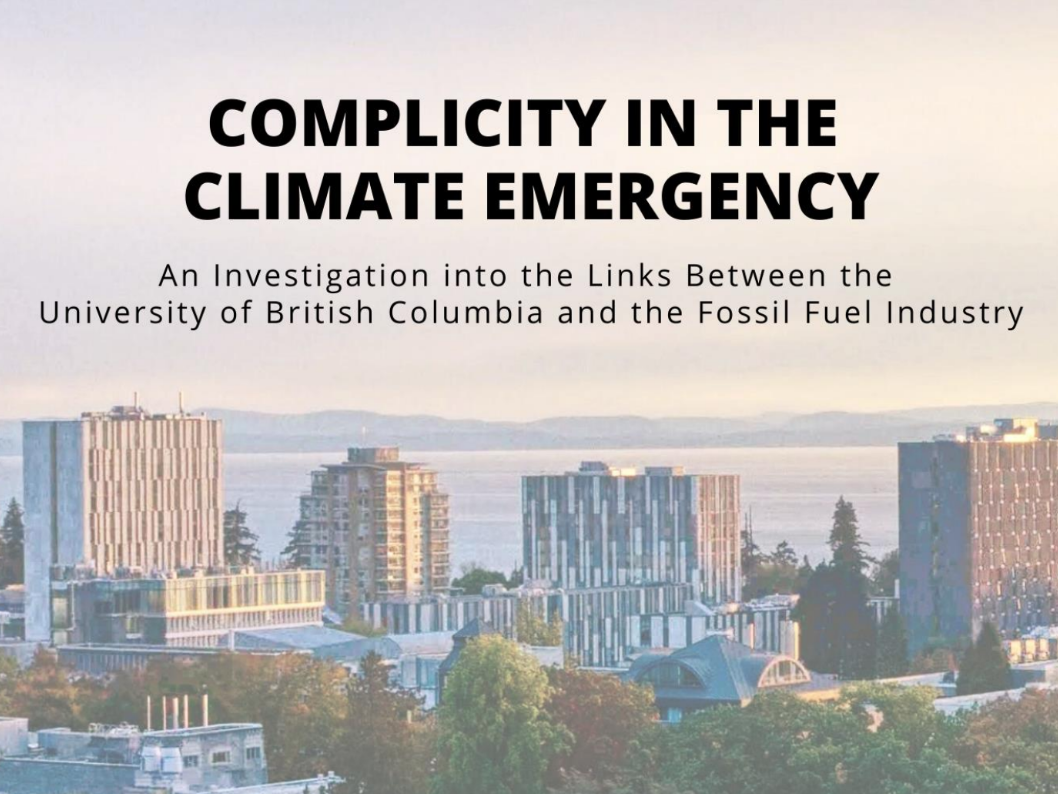
Yasmina:
When I think of the university becoming more of a leader, I think a lot about our post-divestment strategy, and that’s where investments come in. Having the university implement our Reinvestment Campaign demands would be an ideal and extremely prudent step.
We call it our ‘community reinvestment campaign’, so in other words, moving those divested funds that come from large endowments at UBC towards community impact investment vehicles. This is a collaborative campaign between CJUBC, SFU 350, and UVIC and we are calling on our universities to move 10% of their respective endowments and working capital funds into community impact investments, totaling to around 500 million.
We’re asking our university to re-orient those divestments from funds and reinvest in often disinvested communities, areas, and peoples. This acts as a way for UBC to further its responsible investing policies and more adequately prepare communities for the ongoing risks of climate change. It’s an opportunity for us to invest in important projects including local food systems, energy projects, affordable housing projects and more, which is all centred on the idea that we are all able to meet each other’s needs within the community. Therefore, investing in it will create equity and vibrancy that we need to get us through this climate crisis.
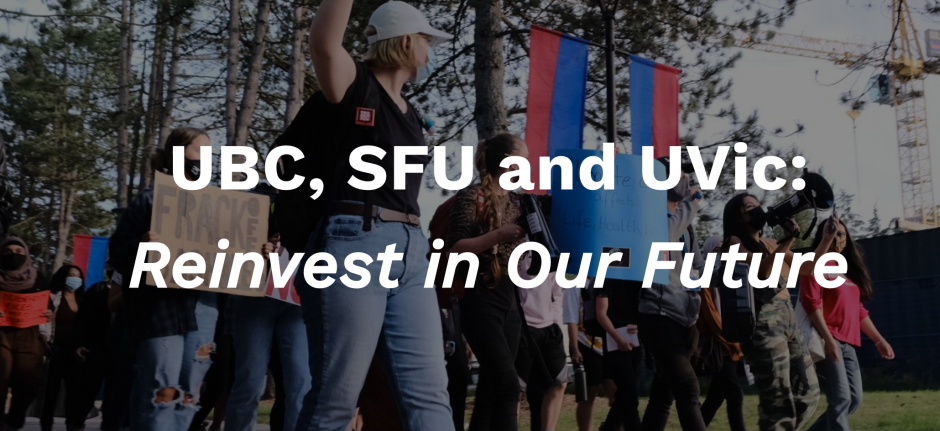
WHAT ARE SOME OF THE CHALLENGES YOU HAVE FACED IN CLIMATE WORK AND HOW, IF POSSIBLE, HAS THE CEF ALLOWED YOU TO OVERCOME THEM?
Michelle:
Prior to receiving the Climate Emergency Fund, it was commonplace for organizers to pay expenses out-of-pocket with no expectation of reimbursement. That isn’t a sustainable model and it creates an exclusionary space where people who have the financial means to be there are the ones who end up dominating the space. Being able to access this fund and pay folks back helps emphasize that organizing shouldn’t just be about sacrifice, but rather, something that brings joy and purpose in healing and community.
The CEF also allowed us to expand the scope of our impact and imaginations by knowing that we had the financial means to turn our ideas into reality; build student power and cross-movement solidarity; and implement greater practices of care and accessibility. An example of this was the creation of the CJUBC access fund to reduce barriers of entry for working class, low-income, disabled, and racialized organizers. It has been wonderful to support folks who would otherwise face financial limitations in their capacity to organize with us!
WHAT FACTORS INVOLVED YOU TO WRITE THE CJUBC CEF GRANT REPORT AND WHAT KIND OF MESSAGE DO YOU THINK IT SENDS?
Michelle:
Something that really influenced us wanting to put together this grant report was an effort to model transparency and accountability, which are two of CJUBC’s community values. It’s important for folks to know how we used the money we received because it helps build mutual trust. It also sends a message that UBC should be doing the same. Another reason was to have this document keep record of what we have done in the past year by amplifying the amazing work our team has done. With the rapid pace of climate work, we so rarely get the time to celebrate our wins, so I hope this grant report serves an invitation to look back on our year and be proud of all that we have accomplished. Funding student-driven activism and organizing work is essential!
Yasmina:
I think a lot of our work has had to rely on being able to try and navigate what the wealth of our university looks like. I think it’s very possible to be transparent about those things. It also made it possible for me to have a more positive understanding of what wealth can look like. Oftentimes our work relies on the inherent understanding that our very neoliberal capitalist world means that ‘money’ is often viewed in a negative way. Looking at this report and viewing the ways the funding we received really supported our group is a very small way of realizing that redirecting wealth, redistributing, and investing in the right people and communities is a large part of creating alternative economies or realities that may get us out of this burdensome world that we live in.
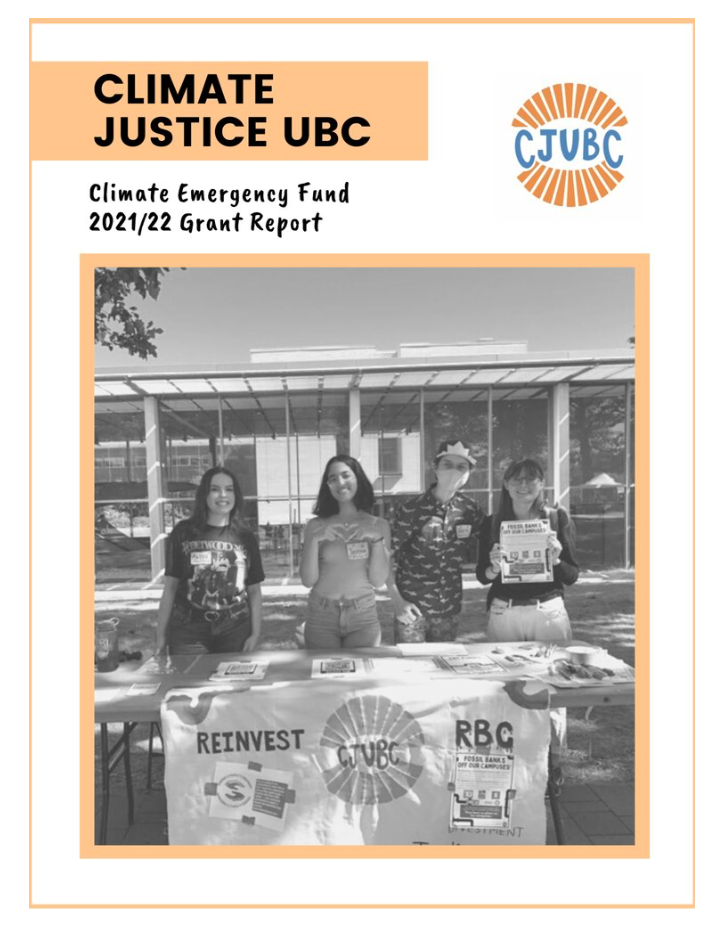
Closing Statement from Michelle and Yasmina:
We are grateful to be here, but also recognizing that we are representing a larger group that makes up CJUBC. There is a collective aspect to of all the work that is being done, as there are so many people that have put in the work to help us get to where we are now.
